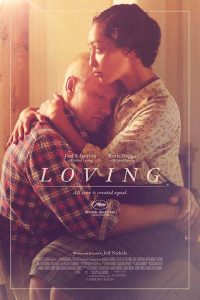Faith and Film: Loving
 Movie Review by Fr. Tom Condon, O.P.
Movie Review by Fr. Tom Condon, O.P.
Loving tells the true story of Richard (Joel Edgerton) and Mildred (Ruth Negga) Loving. When the movie opens in 1959, Mildred tells Richard she is pregnant. Knowing that it was illegal for two people of different races to marry in their home state of Virginia, Richard and Mildred drive to Washington, D.C., to marry. After their marriage, they return to live in Virginia. They are soon arrested and jailed for breaking the law. A judge tells them that they can either leave the state or face a long prison sentence if they remain in Virginia.
At that point, Richard and Mildred move back to Washington. However, a few years later, after the birth of three children, they decide that they do not want to raise their children in the city, but in the country where the children can run and play. After watching Martin Luther King and the 1963 March on Washington, Mildred writes to Bobby Kennedy to ask for his assistance in their case. Kennedy refers their case to the ACLU. An ACLU lawyer contacts the Lovings and tells them that their case could end up at the Supreme Court.
With the backing of the ACLU, the Lovings returned to Virginia, and began a long legal battle to have their marriage recognized there. After many years, their case does make it to the Supreme Court in 1967 where the Lovings win their case. The Supreme Court rules that it is unconstitutional to deny two people of different races the right to marry.
Loving recounts an important historical moment. However, I wish the movie was more involving than it is. Writer-director Jeff Nichols apparently does not want this film to be just one more courtroom drama. We see very little of the inside of the courtroom. Richard and Mildred do not want to be celebrities. They just want to live their lives and raise their family, which is certainly admirable. But in emphasizing the quiet, simple, private lives of these two people, the movie slows down considerably. Nichols fills the screen with many scenes of Mildred sewing and washing dishes, and Richard laying bricks as a mason and working on cars at home. I imagine these scenes are supposed to mirror the legal process which dragged on and on. But they don’t help the film to move.
Richard and Mildred agree to a request for a photographer from Life magazine to come to their home and take photos of the couple. At dinner, the photographer entertains the family with stories of his adventures taking photos. It’s a good moment; the characters come to life and actually seem to be enjoying themselves. Richard actually smiles, I think for the only time in the movie. A few more scenes like this could have helped.
Ruth Negga is a lovely actress with large, expressive eyes, who plays Mildred as a woman who is sweet, yet firm. Joel Edgerton is a fine actor, but he plays Richard as extremely shy, or perhaps even mentally handicapped. He is a man of few words who constantly looks down or averts his gaze, lumbers when he walks, and almost never smiles. While I only know about Richard Loving from this movie, it’s hard to imagine that this man who had the quiet courage and strength to challenge the law and risk jail time and public ridicule would be as inexpressive as Edgerton portrays him.
The film is not without its touching moments, including the opening scene with Richard and Mildred sitting on the porch together, holding hands. But Nichols underplays their story so much, it hurts the overall effect of the movie.
Because Loving tells an important American story, I wish I could say I liked it more than I actually did.
 USA
USA


